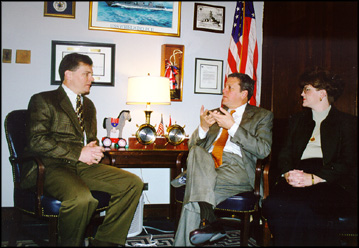| ||
|
|
|
|
|
Farm Bureau calls for demise of death tax
Farm Bureau representatives and other small business owners spoke at a Capitol Hill press conference last week to drum up support for a bill that would phase out the death tax. The legislation (H.R. 8), introduced by Reps. Jennifer Dunn (R-Wash.) and John Tanner (D-Tenn.), would reduce the estate tax rate 5 percent a year until it is eliminated. Estate taxes in the highest bracket--55 percent--would be wiped out after 11 years. Washington State Farm Bureau President Steve Appel, a third generation wheat and barley grower, said that the death tax jeopardizes his children's ability to carry on the family operation because the tax burden would sap the profit-making ability from the farm."It's my hope that my children will become the fourth generation to cultivate our land, but unless death tax laws are changed I'm not sure that will happen," said Appel. Families often have to parcel off pieces of their operations following the death of a loved one in order to pay the resulting tax burden. "That's not productive and it's certainly counter to the American tradition of family-owned farms and ranches," according to Kleckner. Rep. Tanner agrees, saying family businesses carry far more than a monetary value. The elimination of the death tax, he said, "is a societal statement that we believe that saving and investing and passing on generational family farms and small businesses is good, is something that we ought to have as a national policy." The death tax also forces farmers and ranchers to spend valuable time and resources on estate planning just to keep family businesses in the family. "Farmers and ranchers spend countless hours preparing for their deaths," said Kleckner. "They meet with accountants, lawyers and more accountants and lawyers in attempts to protect their farms from government tax collectors. These activities are time consuming, expensive and erode the efficiency of American agriculture." Appel said that his parents used trusts and other estate planning tools in order to pass the farm on to him and his siblings, but even well-laid plans are not foolproof. "They succeeded in keeping our farm in our family, but not without consequences for me," said Appel. "My eight brothers and sisters are now my landlords." Joining Appel at the press conference was Weakley County (Tenn.) Farm Bureau member Keith Fowler, who runs a large row crop and swine operation with his wife, Linda, his father and his father-in-law. The Fowlers received AFBF's Young Farmers and Ranchers Achievement Award last January."Farming is tough enough without any further burdens or obstacles," said Fowler. "The death tax is inefficient, it's unfair and it should be eliminated." Farm Bureau achieved limited estate tax reform during the 105th Congress when lawmakers passed the Taxpayer Relief Act, which increases the estate tax exemption from $600,000 per person to $1 million by 2006, with additional relief for family-owned businesses. While increased exemptions help, Appel maintains that elimination of the tax is still the best option for farmers and ranchers. "Over the years I've seen the value of my land increase to the point that I'm not sure the estate tax exemption will be much help when my children are ready to take over the farm," said the farm leader. "The death tax deserves to die before more family farms and ranches are destroyed." |
|
This page was last modified Fri Mar 05, 1999 at 12:00 am [News] [FB News] [Views] [State Connection] [Issues] [Legislative Action]
[Features] [AG Links] [About Farm Bureau]
[Farm Bureau Programs]
[Farm Bureau Affiliates]
[OnLine Brochures]
© 1996-2000 - American
Farm Bureau Federation. Legal
Notice American Farm Bureau Federation, Farm Bureau and the FB Logo are registered service marks of the American Farm Bureau Federation. Voice of Agriculture is a registered service mark of the American Farm Bureau Federation. |
 Farm Bureau is
once again waging a legislative attack on what American Farm Bureau
Federation
Farm Bureau is
once again waging a legislative attack on what American Farm Bureau
Federation 